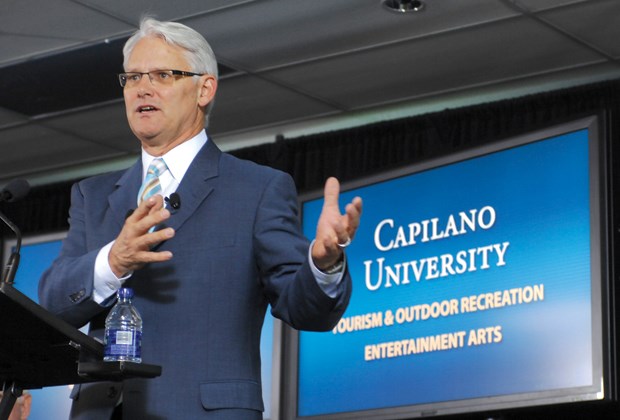On the eve of Capilano College becoming a university in April 2008, the province reneged on $6.3 million in transitional funding and $6 million in annual base funding, despite months of negotiation between Cap's leadership and the Ministry of Advanced Education.
That is among the conclusions in a 2012 report commissioned by the university and recently released through freedom of information requests.
Cap was already one of the lowest funded colleges on a per-student basis in the B.C. system when it sought to go from being a college to a teaching university, based on a funding formula other colleges had used when upgrading, according to the report. ".. .the funding agreement with Capilano was withdrawn and the senior leadership of the institution were invited to sign off on a revised document that made it clear that Capilano. .. would be expected to absorb all existing cost pressures (one-time and base), and that no new funding would be provided by government as a result of transition to university status," post-secondary education expert Don Avison wrote in his report. "The senior leadership of Capilano. .. quite literally on the eve of the finalization of decision and the subsequent commencement of announcements felt they had no choice but to comply."
Since that report, a number of non-degree granting programs have been axed due to budget shortfalls.
But Cap's financial woes today are not due to its university status, but rather to the fact that it has been at or near the bottom of the list when it comes to operating grants on a per-student basis for last 30 years, according to former Cap president Greg Lee.
Without taking on more degree students, Cap wouldn't have been able to compete with the other newly-minted teaching universities on Vancouver Island, in the Interior and Fraser Valley, he added.
"If you look at what happened through the early 2000s, the numbers were continually declining as our finances got tougher and our recruitment problems got more difficult. Becoming a university offered up new programs, which on their own, recovered their costs. They're the ones that kept the institution going. The numbers have gone back up and I think the institution is stronger for it," he said.
When the province developed a funding formula for post-secondary schools in the early 1980s, Cap was running very lean and cost-efficient. As the college and university education needs changed, Cap was stuck with the old funding and has never recovered, Lee said.
"In fairness, we had always said if we get the base funding corrected, we would be in pretty good shape, but we never got the base funding," he said.
But today, the effects of the province pulling the rug on the extra funding are still being felt, said Jane Shackell, chairwoman of Cap's board of governors.
"I can tell you if you had an extra $6 million in our budget every year, we would not be confronting some of the budget decisions we've had to take in the last couple years," she said. "During that time the board has consistently tried to persuade the ministry that we need more funds in order to meet the goals and objectives that we have and that are set for us by government."
West Vancouver-Capilano MLA Ralph Sultan was not part of the decision making process around Cap, though he has always worked closely with the school. Pulling the transitional funding was likely due to tight finances, he said.
"The government was clearly under severe financial pressure and no doubt that was a consideration. Money is always short. Secondly, I don't think the whole Capilano University project was really a project that the ministry particularly endorsed. It wasn't their idea in the first place," Sultan said. "Thirdly, when their arms were twisted, the top management at CapU went along and said OK. I think that was a very unwise decision, but that's the decision they made."
Still, Capilano remains a fine institution that produces career-ready students and it deserves to be strengthened, Sultan said.
"I would hope as government revenues improve each year, that they would find some leeway to help Cap move out of its cellar position. It's way down there at the bottom and it's just not sustainable. There's not a lot of extra cash sloshing around Victoria right now," he said.
In response to questions from the North Shore News, the Ministry of Advanced Education provided a statement saying despite having the second lowest per student funding grant, CapU receives equitable and adequate funding when compared to similar institutions given its size, location and program mix. "Government expects Capilano to make efficient use of its resources, while ensuring a high standard of education for students," the statement read.



